Elizabeth Fortescue
Elizabeth Fortescue is the visual arts writer for the Daily Telegraph, Sydney, and Australian correspondent for The Art Newspaper, London
Homepage: http://www.artwriter.com.au
Posts by Elizabeth Fortescue
Opening of the new Indigenous Galleries, National Gallery of Australia
Oct 2nd
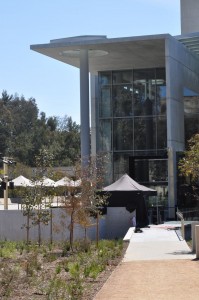 On Thursday I attended the press preview of Stage One of the redevelopment of the National Gallery of Australia, in Canberra. These are the photographs I took on the day.
On Thursday I attended the press preview of Stage One of the redevelopment of the National Gallery of Australia, in Canberra. These are the photographs I took on the day.
The first picture (left) depicts the new front entrance to the gallery. You pass through two sets of sliding glass doors and immediately find yourself inside a vast foyer, filled with light (below).
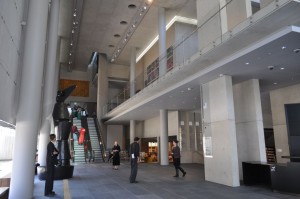
The gallery’s famous Aboriginal Memorial is immediately to your left in a kind of circular well in which it receives abundant natural light and is shown to great advantage. Margaret Olley told me on the day that she had never seen the memorial (below left) “look so spiritual”. The new shop (below right) and cloak room are also in the foyer.
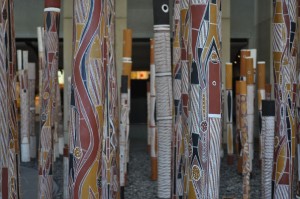
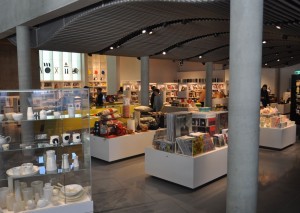
When you are standing in the new foyer, you will see a set of escalators right in front of you. Take the escalator up, and you are in the new indigenous galleries.
I think you will be able to see from the following photographs that the new galleries are a wonderful achievement. Most of them are lit with natural light, while those which contain drawings and other fragile materials have a special feature – they are lit artificially, but the lights are triggered only when someone enters the room. From a conservation and preservation point of view, this is an innovative and impressive idea.
National Gallery director Ron Radford gave a short speech in the foyer, welcoming particularly the 40 indigenous artists who had travelled from all over the country to be at the ceremony.
We went up to the new galleries, where artist Gali Yalkayirriwuy Gurruwirri performed a ceremonial dance (below left and right).
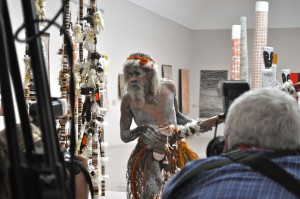
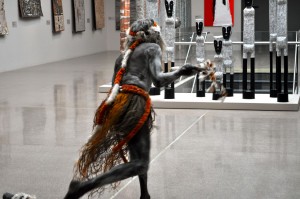
Among those watching the performance was the Maningrida bark master, John Mawurndjul (below).
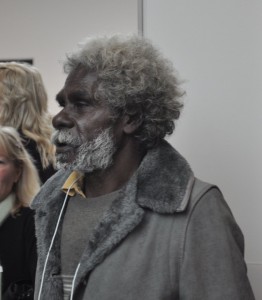
Mawurndjul and fellow Maningrida artist Owen Yalandja (below, with one of his works) were to return to their home the day after the opening, to attend an important men’s ceremony.
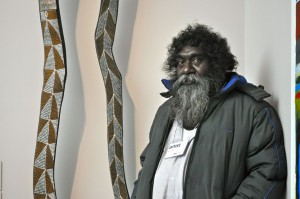
Here are some more pictures, showing the inside of the new indigenous galleries.
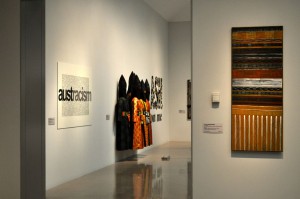
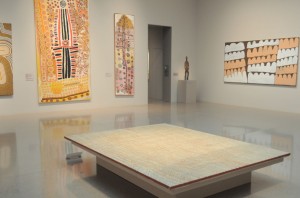
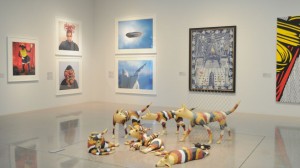
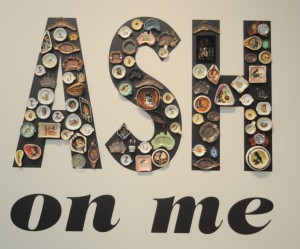
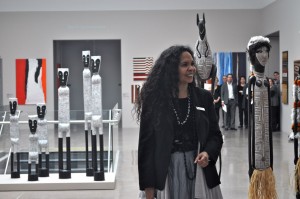 Francesca Cubillo (left), senior curator of Aboriginal and Torres Strait Islander art at the National Gallery, warmly thanked the artists for attending.
Francesca Cubillo (left), senior curator of Aboriginal and Torres Strait Islander art at the National Gallery, warmly thanked the artists for attending.
And finally, on the way out of the building, I met Thanakupi, the artist from Weipa, and spoke to her about her sculpture which was commissioned for the extensions to the building. Titled Eran, meaning “river”, the work depicts animals in the creation stories of the tribes along Weipa’s two rivers – the Evath eran and N’Gath eran. In English, these are the Mission River and the Hay River.
This is Thanakupi’s statement: “The sphere is circle. It is what I centred on in making pots. When looking at the world, it’s unity and the world. Taking that sphere and the designs, that is my art. Fire, earth, mother, unity. Designs on the ground, now on the bauxite, from clay to aluminium.”
Here is a photograph of Thanakupi’s work, Eran.
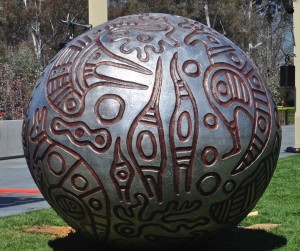
Elizabeth Fortescue, October 2, 2010
Portia Geach Memorial Award: gone to the dogs
Sep 29th
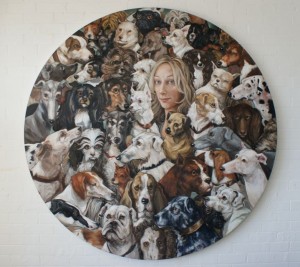
Joanna Braithwaite: Canine Council - self portrait with dogs in art
I found Joanna Braithwaite’s entry to this year’s Portia Geach Memorial Award at the S.H. Ervin Gallery absolutely irresistible. Titled Canine Council – self portrait with dogs in art, it shows Braithwaite almost completely engulfed by dogs of all shapes and sizes.
I looked for Braithwaite’s beloved black pug, Brains, and sure enough he’s there. See if you can spot him.
Joanna has this to say about this work:
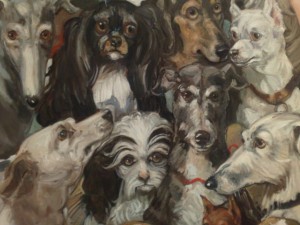
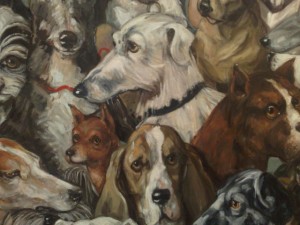
Blake Prize people’s choice; exhibition closes Saturday
Sep 29th
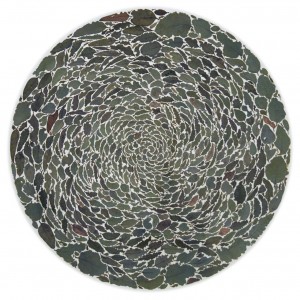
Above and Beyond, by Janine Mackintosh; eucalyptus cyanophylla leaves, linen thread and book binders' gum on canvas. Courtesy of the artist. Photograph by Stephen Cavanagh
Artist Janine Mackintosh has won the People’s Choice award in this year’s Blake Prize for the religious and spiritual in art.
The work is titled Above and Beyond, and is made of gum leaves.
There’s not much time left to see the Blake, which closes on Saturday (October 2) at the National Art School Gallery in Darlinghurst. It then goes on tour.
Elizabeth Fortescue, September 29, 2010
Paul Connor, the kayaking artist of Sydney Harbour
Sep 27th
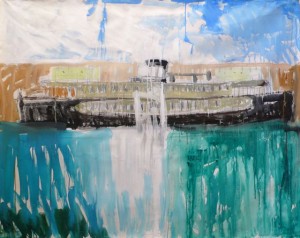
Baragoola Versus the Sun, by Paul Connor
You could call Paul Connor the kayaking artist of Sydney Harbour. I interviewed Paul this week at his Balmain home and we walked down to the waterfront at Mort Bay where he launched his kayak. Strapped to the bow of his kayak is small wooden box containing a basic painting kit including gouaches and brushes.
Living close to Mort Bay and loving to paint en plein air (he established the NSW Parliament Plein Air Painting Prize a couple of years ago), Paul regularly shoulders his kayak and pops it in the water just near the old Colgate factory which is now a very up-market apartment block.
I would like to share with you the photos I took that day, of Paul launching his little boat and being photographed by Katrina Tepper, the Daily Telegraph photographer with whom I was covering the story that day.
Paul’s paintings, full of light and atmosphere, are on view at the Depot Gallery in Danks St, Waterloo, until October 2.
I enjoy Paul’s paintings because they are full of the joy he has in exploring the tiny inlets of Sydney’s inner harbour. They celebrate the tug boats and slipways, the slop of the water against the sea wall, the oyster-encrusted wharf pylons and (as in the image above) the old Manly ferry, the Baragoola.
There is a touch of Huckleberry Finn about these paintings. And about Paul, too, I suspect.
Elizabeth Fortescue, September 28, 2010
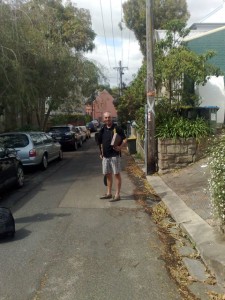
Paul Connor getting ready to go painting on his kayak
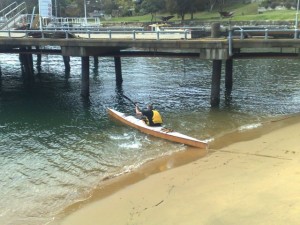
Paul Connor launching his kayak
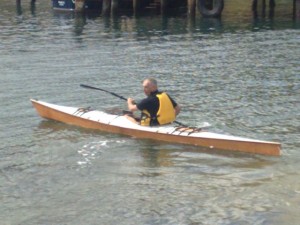
Paul Connor in his kayak
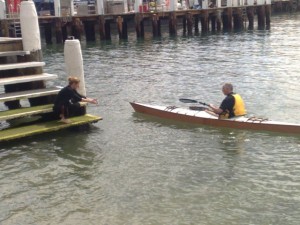
Katrina Tepper taking photographs of Paul for the Daily Telegraph
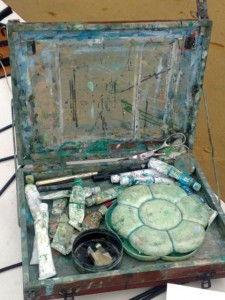
Paul Connor's painting kit, which he straps on to his kayak's bow
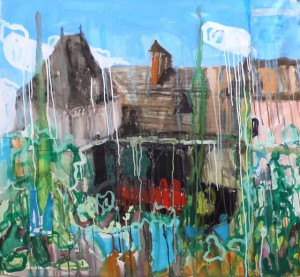
- This image (above) is not of Sydney Harbour, but it is beautiful and it is in the exhibition, as well. It is called Dordogne Reconstructed.
Cathy Weiszmann exhibition full of quiet wisdom
Sep 27th
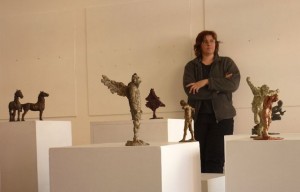
Cathy Weiszmann and her small sculptures
This is a picture of Cathy Weiszmann which I took at Kerrie Lowe Gallery in Newtown this month. I met Cathy while doing a story on her for the Daily Telegraph, Sydney. The story appeared in the paper on September 20. Her exhibition is on until October 5.
Actually, if you’re sporty, you’ll probably know Cathy’s work already. Cathy was commissioned to create life-sized sculptures of various sporting greats for the Sydney Cricket Ground, and elsewhere.
In this exhibition, however, we see Cathy’s more personal work. It springs from her observations of real life and of the people around her at Sydney University, where she works in the IT department.
My favourite piece is illustrated on this page. It is an office worker carrying the ubiquitous cardboard take-away coffee tray. The tray is made for four cups, but it carries only three. What has happened to the missing fourth person? Pensioned off? Made redundant? Services no longer required? Died of a heart attack in a lonely flat? We can only guess at the origin of the pathos which infuses this very tender work.
This is an exhibition full of truth and quiet wisdom. I have uploaded some of the images that I took that day.
Elizabeth Fortescue, September 27, 2010
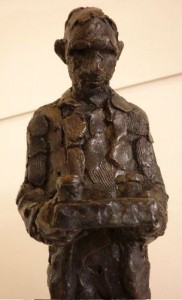
Mortality, a bronze by Cathy Weiszmann
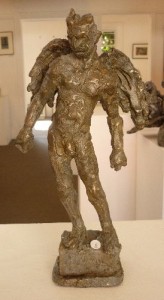
A bronze by Cathy Weiszmann
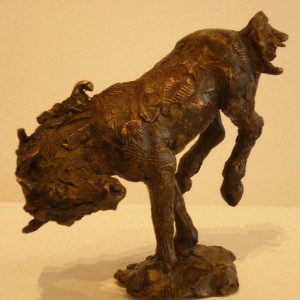
A bronze by Cathy Weiszmann
